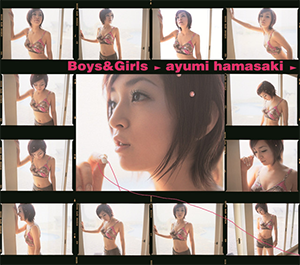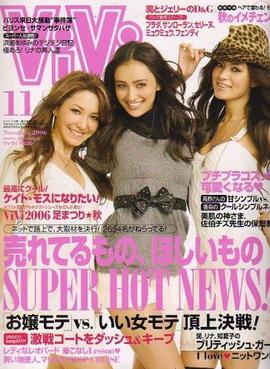
Ayumi Hamasaki is a Japanese singer, songwriter, record producer, actress, model, spokesperson, and entrepreneur. By 2002, Hamasaki had earned the nickname "Empress of J-pop" due to her popularity in Japan and throughout Asia, as well as being referred to as "the voice of the lost generation". Due to her success and relevance throughout her career, she is considered one of the top solo female artists of the Heisei era for her influence on the music industry and various fashion trends.

Loveppears is the second studio album by Japanese recording artist Ayumi Hamasaki. It was released in Japan, Hong Kong and China on November 10, 1999, through Avex Trax and the China Record Corporation, and distributed worldwide on April 10, 2001, by Avex Entertainment Inc. It was entirely written by Hamasaki herself, while the production was handled by Japanese musician Max Matsuura. Musically, Loveppears is a dance album and lyrically focuses on themes of love, frustration of life, loneliness, and individualism.

A Best is the first greatest hits album by Japanese singer-songwriter Ayumi Hamasaki. It was released on March 28, 2001, by Avex Trax and Avex Music Creative Inc. Hamasaki had originally planned to release the greatest hits album after her 2002 studio album I Am..., but the idea was denied by Avex head staff. Instead, Avex released the album in 2001, which caused conflict between the label and Hamasaki. The compilation was released in two different formats including a physical and a digital release. Seven different artworks were released in several editions of the album. The album includes one new track, three re-recorded tracks, and the rest of previously released singles.

"Surreal" is a song by Japanese recording artist Ayumi Hamasaki, taken from her third studio album Duty (2000). It was written by Hamasaki and produced by Max Matsuura. The song is a rock with elements of alternative rock. "Surreal" describes Hamasaki's madness and sense of confusion, while the themes of "Surreal" are based on Hamasaki's concept of loneliness, chaos, confusion, and the burden of her responsibilities, aimed mostly toward her public image as a recording artist. It was released as the fourth single from the album on 27 September 2000 by Avex Trax and Avex Taiwan.

"Boys & Girls" is a song recorded by Japanese recording artist Ayumi Hamasaki, serving as the fourth single for her second studio album, Loveppears (1999). It was released by Avex Trax in Japan and Hong Kong on July 14, 1999, and through Avex USA in North America in early 2001, while being re-distributed in 2003. "Boys & Girls" marks Hamasaki's first single to be made available for purchase as a maxi single with additional remixes. The track was written by the singer herself, while production was handled by long-time collaborator Max Matsuura. Musically, the song is a dance recording, a genre that heavily influences Loveppears. The single's lyrical content is written in third-person perspective.

"Appears" is a song recorded by Japanese recording artist Ayumi Hamasaki. It was released by Avex Trax on November 10, 1999 as the sixth single from her second studio album Loveppears (1999), which was released on the same day. Alongside this, it has been released in several other territories with different release dates under her Western alias Ayu. It also served as Hamasaki's first limited edition single, limiting physical sales to 300,000 copies. The track was written by Hamasaki herself, while production was handled by long-time collaborator Max Matsuura. Musically, "Appears" is a dance song written in third person perspective, and is about the third person watching what appears to be a happy and loving relationship. Upon its release, "Appears" received positive reviews from music critics. Alexey Eremenko, writing for AllMusic, selected the track as the best song from the album and her career. However, an editor from CD Journal criticized the amount of remixes on the CD single.

"Kanariya" is a song recorded by Japanese recording artist Ayumi Hamasaki for her second studio album, Loveppears (1999). It was released by Avex Trax in Japan and Hong Kong on December 8, 1999, and through Avex USA in North America in early 2000. The recording also served as Hamasaki's second limited edition single, with limited physical units of 300,000 copies. The track was written by Hamasaki herself, while production was handled by long-time collaborator Max Matsuura. Two versions of "Kanariya" were made available for consumption—a radio edit produced by American disc jockey Jonathan Peters, and the album version composed by Yasuhiko Hoshino. Lyrically, the song was written in third person perspective.

"Fly High" is a song recorded by Japanese recording artist Ayumi Hamasaki. It was released by Avex Trax in Japan on February 9, 2000, and through Avex Entertainment Inc. worldwide in September 2008. The recording served as Hamasaki's third and final limited edition single from her second studio album, Loveppears (1999), limiting physical units to 300,000 copies. The track was written by the singer herself, while production was handled by long-time collaborator Max Matsuura. Two versions of "Fly High" were made available for consumption—a radio edit composed by HΛL, and the album version produced by Dai Nagao. Lyrically, the song was written in third person perspective.

"Vogue" is a song recorded by Japanese recording artist Ayumi Hamasaki for her third studio album, Duty (2000). It was written by Hamasaki, while production was handled by Max Matsuura. It premiered on April 26, 2000 as the lead single from the album. Her third consecutive lead single to be produced by Matsuura, the song is part of a trilogy from Duty; the other two singles being "Far Away" and "Seasons".

"Far Away" is a song recorded by Japanese recording artist Ayumi Hamasaki for her third studio album, Duty (2000). It was written by Hamasaki, while production was handled by Max Matsuura. It premiered on May 17, 2000, as the second single from the album. The song is part of a trilogy from Duty; the other two singles being "Vogue" and "Seasons".

"Seasons" is a song by Japanese recording artist Ayumi Hamasaki for her third studio album, Duty (2000). It was written by Hamasaki, while production was handled by Max Matsuura. It premiered on June 7, 2000, as the third single from the album. The song is the final part of a trilogy from Duty; the other two singles being "Vogue" and "Far Away".

Ayumi Hamasaki Complete Clip Box A, by Ayumi Hamasaki, was released on February 25, 2004.

Guilty is the ninth studio album by Japanese recording artist Ayumi Hamasaki. It was released on January 1, 2008 by Avex Trax. Guilty marks Hamasaki's ninth consecutive album to be fully produced by Japanese producer and manager Max Matsuura, while she contributes to the album as the lead vocalist, background vocalist, and songwriter to all songs. Recorded in Japanese with minor phrases in English, Guilty is a rock album with numerous musical elements such as pop rock, heavy metal, synthrock, and power ballad melodies.

ViVi (ヴィヴィ) is a Japanese fashion magazine published by Kodansha. It is published in Japan, China, Taiwan, Hong Kong, and Thailand.

"Rule"/"Sparkle" is a double A-side single by Japanese recording artist Ayumi Hamasaki from her tenth studio album, Next Level (2009). The song was released on a CD and DVD format on February 25, 2009 as the second single from the album. With "Rule" composed by Miki Wantanabe and "Sparkle" composed by Kazuhiro Hara, both songs were written by Hamasaki and produced by long-time collaborator Max Matsuura. "Rule" was used as the international theme song for the 2009 film Dragonball Evolution.

Next Level is the tenth studio album by Japanese recording artist Ayumi Hamasaki. It was released through Avex Trax on March 25, 2009 in five physical formats, and for digital consumption. The album was solely produced by Avex Trax owner Max Matsuura, whereas the album's content was written by Hamasaki herself. Additionally, it marks a return for several composers that helped construct her previous records, including Dai Nagao, CMJK, Kazuhiro Hara, HΛL, amongst others. Stylistically, Next Level is a departure from her previous albums, focusing on electronic music with elements of rock and dance.

Rock 'n' Roll Circus is the eleventh studio album by Japanese recording artist Ayumi Hamasaki. It was released on April 14, 2010, by Avex Trax. It was also released just a little over a year after her 2009 album, Next Level. Rock 'n' Roll Circus marks Hamasaki's eleventh consecutive album to be fully produced by Japanese producer and manager Max Matsuura, while she contributes to the album as the lead vocalist, background vocalist, and songwriter to all songs. Recorded in Japanese with minor phrases in English, Rock 'n' Roll Circus is a rock album with numerous musical elements such as electropop, J-pop, rock, pop ballad, and dance music.

Love Songs is the twelfth studio album by Japanese singer-songwriter Ayumi Hamasaki. The album was released on December 22, 2010, through Avex Trax, eight months after her eleventh studio album Rock 'n' Roll Circus. A stylistic return to the aesthetic of her albums before Secret, Love Songs contains pop songs with lyrics primarily revolving around love, many of them ballads.

Ayumi Hamasaki 15th Anniversary Tour: A Best Live is Japanese pop singer Ayumi Hamasaki's 36th DVD/Blu-ray release. It was released on October 30, 2013. The tour was held to celebrate Hamasaki's 15th anniversary in the music industry, with her performing 28 shows in Japan from mid-April to late July. The tour started on April 13, 2013 at Saitama Super Arena and finished with two final shows at Yoyogi National Gymnasium on July 27 and 28, 2013.

Ayumi Hamasaki Arena Tour 2015 A: Cirque de Minuit – The Final is Japanese pop singer Ayumi Hamasaki's 40th DVD/Blu-ray release. It was released on October 28, 2015. The tour started on April 11, 2015, at Saitama Super Arena and initially ended on June 7, 2015, at Yoyogi National Gymnasium. However, four additional dates - promoted as "The Final" - were added and the tour finished on July 5, 2015, at Yokohama Arena.

















